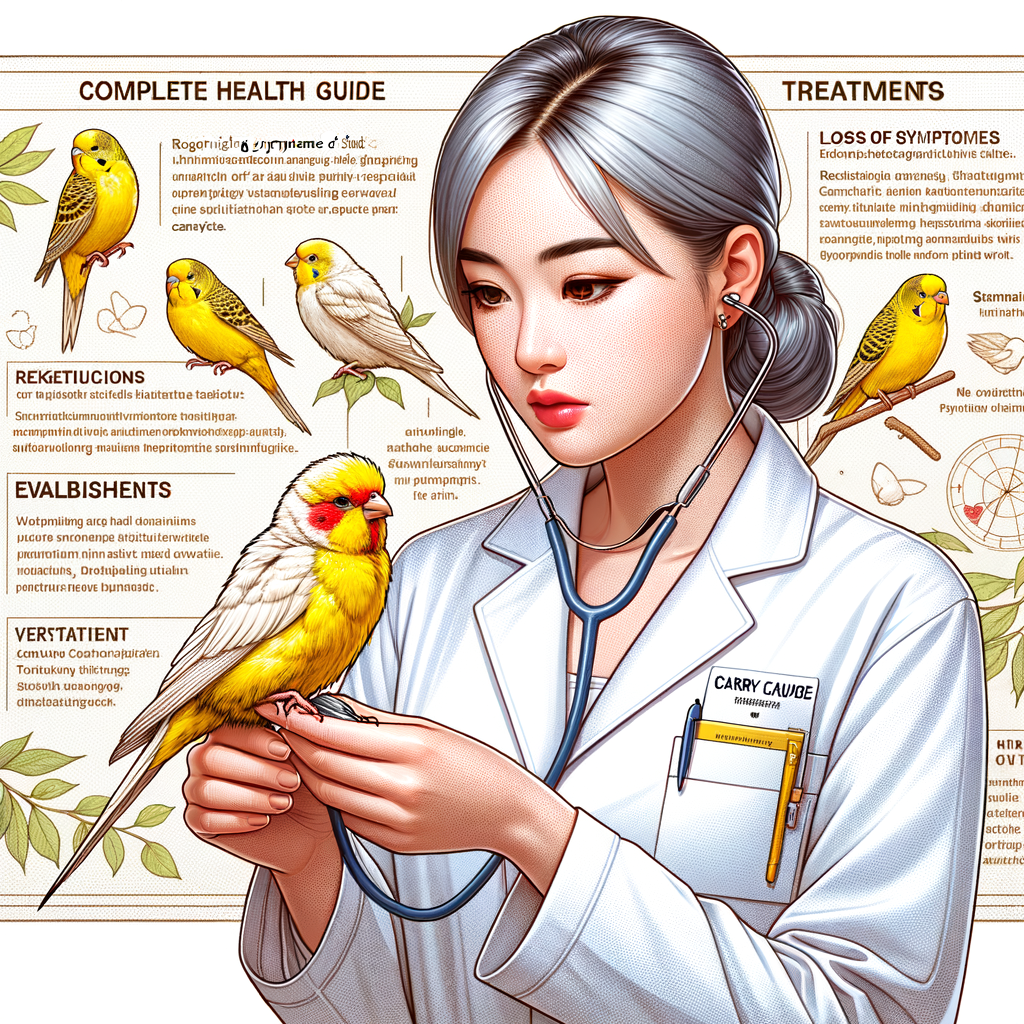
Introduction to Canary Birds Health Problems
Canary birds are known for their vibrant colors and melodious songs. However, like any other pet, they can also face various health problems. This introduction will provide an overview of common health issues in canary birds and emphasize the importance of understanding their health for their well-being.
- Overview of common health issues
- Importance of understanding canary health
Canary birds can suffer from a range of health issues. Some of the most common ones include respiratory diseases, mites, and nutritional deficiencies. Each of these problems can affect the bird’s quality of life and longevity. Understanding these issues can help you identify symptoms early and seek appropriate treatment.
Understanding the health of your canary bird is crucial for its well-being. It helps you to identify any changes in their behavior or appearance that may indicate a health problem. Early detection of health issues can lead to more effective treatment and a better chance of recovery. Additionally, understanding your bird’s health can also guide you in providing the right diet and environment to prevent potential health problems.
In the following sections, we will delve deeper into the common diseases and symptoms, prevention strategies, and treatment options for canary bird health issues. This guide aims to equip you with the knowledge to keep your canary bird healthy and happy.
Common Canary Diseases and Symptoms
Canaries are beautiful and vibrant birds, but like any other pet, they can also fall ill. Understanding the common diseases that can affect canaries and their symptoms can help you take better care of your feathered friend.
Symptoms of Sick Canary
When your canary is not feeling well, it may show a variety of signs. Here are two key symptoms to watch out for:
- Changes in Behavior: Canaries are usually active and cheerful birds. If your canary becomes unusually quiet, lethargic, or stops singing, it could be a sign that it is not feeling well. Changes in eating habits, such as eating less or more than usual, can also indicate illness. Additionally, if your canary is sitting at the bottom of the cage instead of its perch, it may be unwell.
- Physical Signs of Illness: Physical signs of illness in canaries can include ruffled feathers, weight loss, or changes in the appearance of their droppings. You might also notice a change in their eyes, such as redness or discharge. If your canary has difficulty breathing, it could be a sign of a respiratory disease. It’s important to take your canary to a vet if you notice any of these signs.
Remember, early detection of illness can make a significant difference in your canary’s health. If you notice any changes in your canary’s behavior or physical appearance, it’s best to consult with a vet immediately.
Common Canary Bird Illnesses
Canary birds, like any other living creatures, can fall prey to various health issues. Some of these illnesses are more common than others. Understanding these common diseases can help you spot the symptoms early and seek appropriate treatment. Let’s take a closer look at some of the most common canary bird illnesses:
- Respiratory Diseases
- Digestive Problems
- Parasitic Infections
Respiratory diseases are quite common in canary birds. These illnesses can be caused by a variety of factors, including bacteria, viruses, and environmental conditions. Symptoms often include difficulty breathing, wheezing, and a change in the bird’s song. It’s crucial to keep your bird’s environment clean and well-ventilated to prevent these diseases.
Canaries can also suffer from digestive problems. These can be caused by a poor diet, stress, or infection. Symptoms can include loss of appetite, weight loss, and changes in droppings. Providing your bird with a balanced diet and a stress-free environment can help prevent these issues.
Parasitic infections are another common health issue in canaries. These can be caused by mites, lice, or worms. Symptoms can include itching, feather loss, and changes in behavior. Regularly cleaning your bird’s cage and providing preventative treatments can help keep these parasites at bay.
Remember, early detection is key in treating these illnesses. If you notice any changes in your bird’s behavior or appearance, it’s best to consult with a vet immediately.
Canary Bird Care: Preventing Health Issues
One of the best ways to prevent health issues in canary birds is through proper care and attention. This includes providing them with a balanced diet and ensuring they get regular exercise. In this section, we will focus on the importance of proper nutrition for canary birds.
Proper Nutrition for Canary Birds
Just like humans, canary birds need a balanced diet to stay healthy. This means providing them with a variety of foods that offer the nutrients they need. Let’s delve into the importance of a balanced diet and common dietary mistakes to avoid.
- Importance of a balanced diet
- Common dietary mistakes
A balanced diet for a canary bird should include seeds, fruits, vegetables, and a source of protein. Seeds are the mainstay of a canary’s diet, but they should be supplemented with fresh fruits and vegetables for vitamins and minerals. A source of protein, like boiled eggs or a specially formulated pellet food, is also important for maintaining good health.
Providing a balanced diet helps to prevent nutritional deficiencies, which can lead to health problems. It also ensures that your bird has the energy it needs to sing, fly, and engage in other activities.
One of the most common mistakes bird owners make is feeding their canaries a diet that is too high in fat. While seeds are an important part of a canary’s diet, they should not be the only thing your bird eats. Too many seeds, especially sunflower seeds, can lead to obesity and other health problems.
Another common mistake is not providing enough fresh water. Canaries need fresh water every day, not just for drinking but also for bathing. Bathing helps to keep their feathers in good condition.
In conclusion, proper nutrition is a key factor in preventing health issues in canary birds. By providing a balanced diet and avoiding common dietary mistakes, you can help ensure your bird stays healthy and happy.
Importance of Regular Exercise
Just like us humans, canary birds also need regular exercise to stay healthy and happy. Exercise helps canaries to keep their muscles strong, their minds sharp, and their spirits high. Let’s delve into the benefits of physical activity for canaries and some tips for encouraging exercise.
- Benefits of Physical Activity for Canaries
- Muscle Strength: Regular exercise helps canaries maintain strong muscles, which are essential for flying and other activities.
- Improved Mood: Exercise can also help to improve a canary’s mood, reducing stress and anxiety.
- Longevity: Studies have shown that canaries who exercise regularly tend to live longer, healthier lives.
- Tips for Encouraging Exercise
- Provide a Large Cage: Canaries need space to fly around. A larger cage allows them to exercise more freely.
- Include Perches and Toys: Perches and toys can stimulate your canary and encourage more movement.
- Regular Out-of-Cage Time: Allow your canary time outside of the cage every day under supervision. This will encourage them to fly and explore, providing excellent exercise.
Physical activity is crucial for canaries for several reasons:
Here are some tips to encourage your canary to exercise:
Remember, a healthy canary is a happy canary. By ensuring your feathered friend gets regular exercise, you’re helping them to lead a long, healthy, and joyful life.
Treatment for Canary Diseases
When it comes to the health of your canary bird, understanding the treatment options for various diseases is crucial. This section will guide you on when to seek professional vet care and how to choose the right avian vet.
When to Seek Canary Bird Vet Care
Knowing when to seek professional help is essential for the well-being of your canary bird. Let’s explore the two key aspects of this process.
- Recognizing Emergency Situations
- Choosing the Right Avian Vet
Emergency situations require immediate attention. Signs of distress in canaries may include changes in behavior, loss of appetite, difficulty breathing, or unusual droppings. If your bird exhibits any of these symptoms, it’s time to seek professional help immediately.
Choosing the right vet for your bird is as important as recognizing when they need help. Look for a vet who specializes in avian care, as they will have the necessary experience and knowledge to treat your canary. It’s also important to find a vet who communicates well and makes you feel comfortable, as they will be your partner in ensuring your bird’s health.
In conclusion, understanding when to seek vet care and choosing the right avian vet are crucial steps in treating canary diseases. Always be attentive to your bird’s behavior and health, and don’t hesitate to seek professional help when needed.
Home Care for Sick Canaries
When your canary bird falls sick, it’s crucial to know how to provide home care. This involves supportive care techniques and understanding when to seek professional help. Let’s delve into these two crucial aspects.
- Supportive Care Techniques
Supportive care is all about making your canary comfortable and helping it to recover. Here are a few techniques:
- Warmth: Sick canaries often struggle to maintain their body temperature. Keep your bird warm by placing its cage in a warm room or using a cage heater.
- Hydration: Ensure your bird has access to fresh, clean water at all times. Hydration aids in recovery.
- Nutrition: A balanced diet is essential for a sick canary. Feed it with high-quality bird feed and include fruits and vegetables for added vitamins.
- Rest: Allow your bird plenty of rest. Minimize noise and disturbances around its cage.
- When to Seek Professional Help
While home care is important, it’s equally crucial to know when to seek professional help. Here are some signs that your canary needs a vet:
- Persistent Symptoms: If your bird’s symptoms persist for more than a few days despite home care, it’s time to consult a vet.
- Severe Symptoms: Symptoms like loss of appetite, difficulty breathing, or bleeding are serious. Seek immediate professional help.
- Behavior Changes: If your canary is unusually quiet, inactive, or shows signs of distress, it may need a vet’s attention.
Remember, a sick canary requires both your care and professional medical attention. By understanding when to provide home care and when to seek professional help, you can ensure your bird’s swift recovery.
Canary Bird Health Guide: Key Takeaways
As we conclude our comprehensive guide on canary bird health, let’s summarize the most important points. These key takeaways will help you ensure your canary bird stays healthy and happy.
- Importance of Prevention
- Recognizing Signs of Illness
- Seeking Timely Treatment
Prevention is always better than cure, especially when it comes to the health of your canary bird. Regularly cleaning the bird’s cage, providing a balanced diet, and ensuring a stress-free environment can significantly reduce the risk of health issues. Remember, a healthy bird is a happy bird.
Being able to recognize the signs of illness in your canary bird is crucial. Changes in behavior, loss of appetite, or unusual droppings can all be indicators of health problems. Always keep a close eye on your bird and take note of any changes in its usual behavior.
If you notice any signs of illness, it’s important to seek veterinary care as soon as possible. Early detection and treatment can make a significant difference in the outcome of many common canary diseases. Remember, your bird’s health is in your hands.
In conclusion, the health of your canary bird depends largely on your care and attention. By focusing on prevention, recognizing signs of illness, and seeking timely treatment, you can ensure your bird leads a long, healthy, and happy life.
Case Studies: Overcoming Common Bird Health Issues
In this section, we will delve into real-life case studies that highlight the journey of overcoming common bird health issues. Our first case study focuses on respiratory disease, a common ailment in canary birds.
Case Study 1: Overcoming Respiratory Disease
Respiratory disease in birds, particularly canaries, can be a serious concern. Let’s explore a case where a canary bird successfully overcame this health issue.
- Background of the case:
- Treatment and recovery:
In this case, a two-year-old canary named Sunny started showing symptoms of respiratory distress. Sunny’s owner noticed the bird was breathing heavily, had a decreased appetite, and was less active than usual. After a visit to the vet, Sunny was diagnosed with a respiratory disease caused by a bacterial infection.
Sunny’s vet prescribed a course of antibiotics to fight the bacterial infection. Along with the medication, Sunny’s cage was thoroughly cleaned and disinfected to prevent further infection. The owner was also advised to keep Sunny in a warm, stress-free environment to aid recovery.
After two weeks of consistent treatment and care, Sunny showed significant improvement. His breathing returned to normal, and he regained his appetite and energy. This case highlights the importance of early detection and appropriate treatment in overcoming bird health issues.
Remember, each bird is unique, and what worked for Sunny may not work for all birds. Always consult with a professional vet if your bird shows signs of illness.
Case Study 2: Beating Parasitic Infection
Let’s delve into a real-life example of a canary bird overcoming a parasitic infection. This case study will provide valuable insights into the background of the case, the treatment process, and the bird’s recovery journey.
- Background of the case
- Treatment and recovery
Our feathered friend in this case study is a vibrant canary named Sunny. Sunny’s owner noticed that the bird was not its usual chirpy self. It was losing feathers, had a decreased appetite, and seemed lethargic. A visit to the vet confirmed that Sunny was suffering from a parasitic infection, specifically from a parasite known as ‘Cnemidocoptes Pilae’, commonly referred to as ‘scaly face mites’.
These mites are microscopic parasites that burrow into the skin of birds, causing discomfort and health issues. In Sunny’s case, the infection was caught early, which increased the chances of a successful treatment.
The vet prescribed a treatment plan for Sunny that included a series of anti-parasitic medications. The treatment was to be applied topically to the affected areas for a period of two weeks. In addition to the medication, Sunny’s cage was thoroughly cleaned and disinfected to prevent re-infestation.
With consistent treatment and care, Sunny began to show signs of improvement. The bird’s appetite returned, and it started to regain its lost feathers. After a month, Sunny was back to its vibrant, chirpy self, free from the parasitic infection.
This case study highlights the importance of early detection and appropriate treatment in managing parasitic infections in canary birds. It also underscores the need for maintaining cleanliness and hygiene in the bird’s living environment to prevent such health issues.
| Case Summary |
|---|
| Canary’s Name: Sunny |
| Health Issue: Parasitic Infection (Scaly Face Mites) |
| Treatment: Anti-parasitic medication, cage disinfection |
| Recovery Time: One month |







